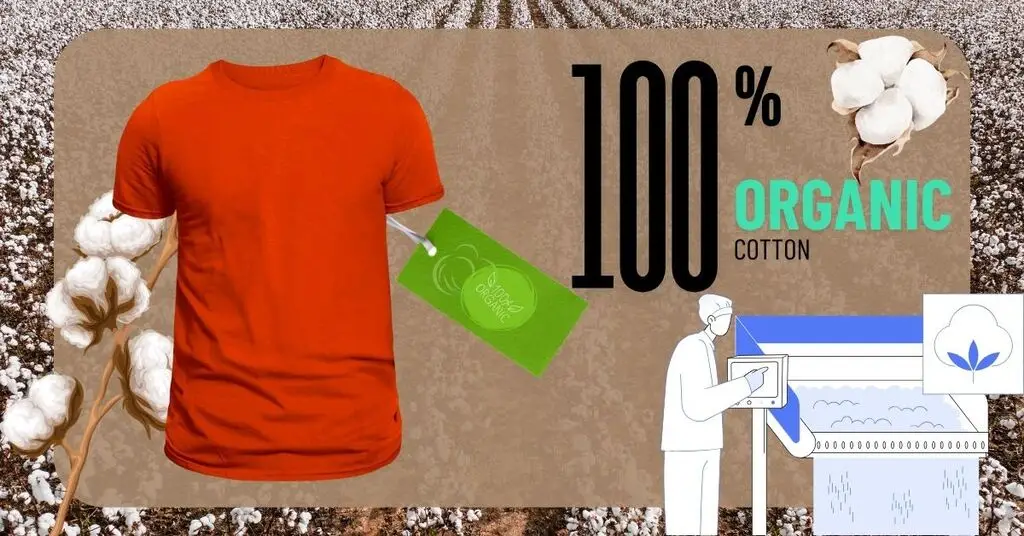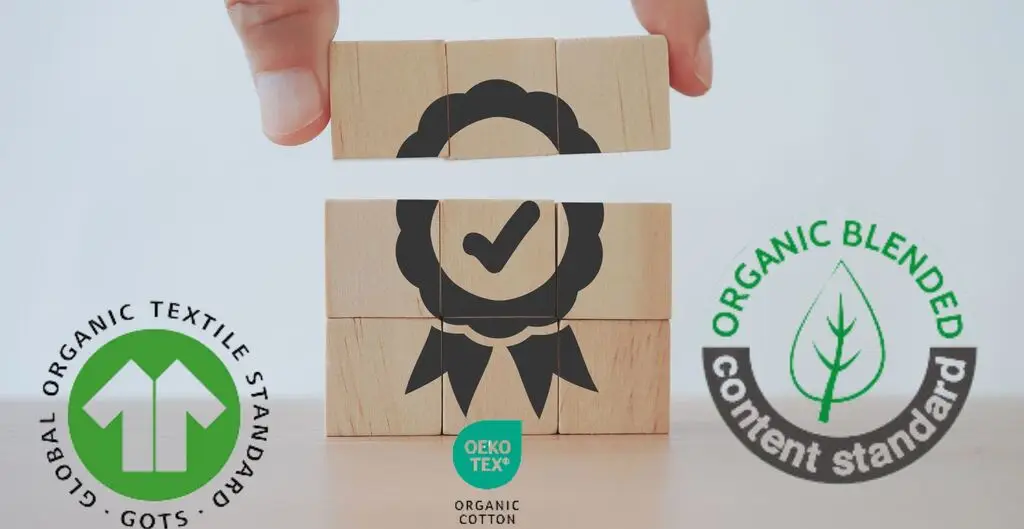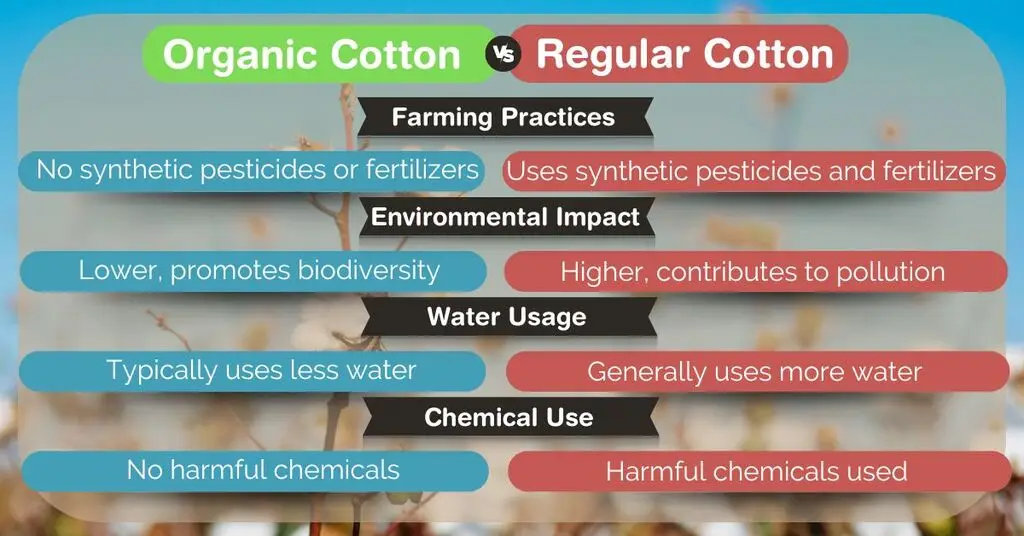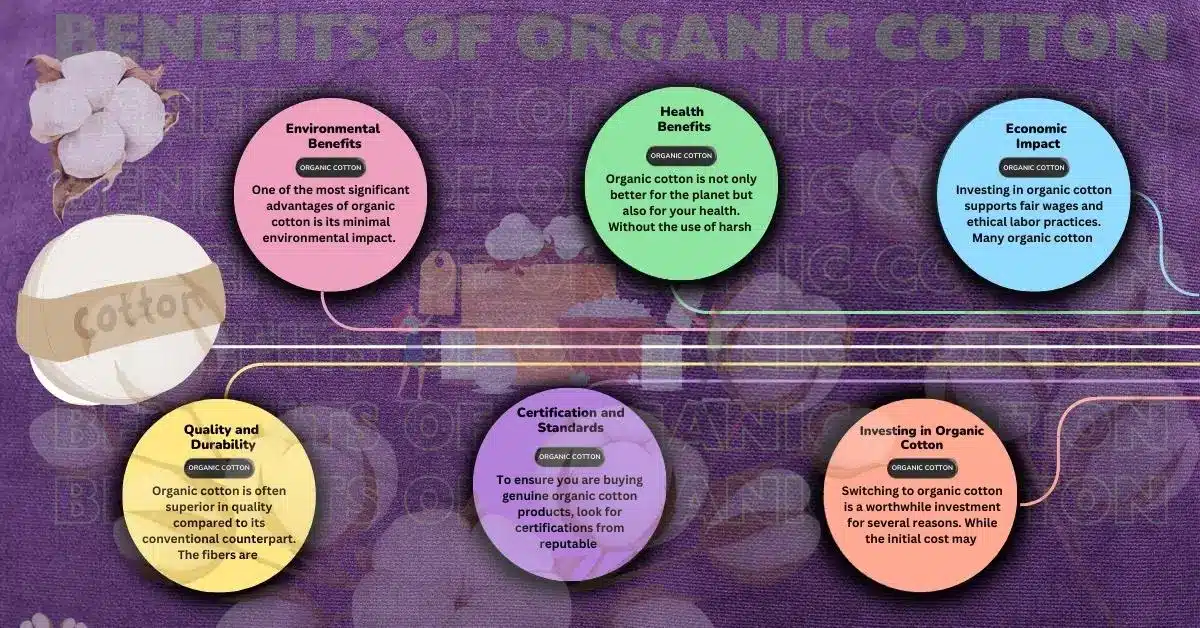Organic cotton is more than just a buzzword; if we talk about Benefits of Organic cotton it represents a commitment to sustainability, health, and ethical production in the textile industry. As consumers become more aware of the environmental and social impacts of their purchases, the demand for organic cotton has surged. But what exactly makes organic cotton so special, and why should you consider investing in it?
Table of contents
- What is Organic Cotton?
- Environmental Benefits
- Health Benefits
- Economic Impact
- Quality and Durability
- Organic Cotton in Fashion
- Organic Cotton in Home Goods
- Certification and Standards
- Challenges and Misconceptions
- How to Identify Organic Cotton Products
- Investing in Organic Cotton
- Case Studies and Success Stories
- Conclusion
- Famous Products made with Organic cotton
- Most Asked Questions!
What is Organic Cotton?
Organic cotton is grown using methods and materials that have a low impact on the environment. This cotton is cultivated without the use of toxic and persistent pesticides and synthetic fertilizers. Additionally, organic farming replenishes and maintains soil fertility and builds biologically diverse agriculture. This is in stark contrast to conventional cotton, which often relies heavily on chemicals and intensive farming practices. Read A Detailed Article About Organic Cotton Here.
The Growing Process
Organic cotton farming involves a holistic approach to agriculture. Farmers use natural fertilizers such as compost and animal manure to enrich the soil. Crop rotation is a common practice, which helps maintain soil health and reduce pest problems. These methods not only produce high-quality cotton but also contribute to the overall health of the ecosystem.

Environmental Benefits
One of the most significant advantages of organic cotton is its minimal environmental impact. Conventional cotton farming is notorious for its heavy pesticide use, which can contaminate water sources and harm wildlife. In contrast, organic cotton farming reduces the reliance on these harmful chemicals, leading to cleaner water and healthier soil. Furthermore, organic cotton farming generally uses less water, thanks to healthier soil retaining more moisture.
Health Benefits
Organic cotton is not only better for the planet but also for your health. Without the use of harsh chemicals, organic cotton products are free from potentially harmful residues. This makes them a safer choice, especially for those with sensitive skin or allergies. Moreover, the absence of pesticides and synthetic fertilizers makes the working environment safer for farmers and their communities.
Economic Impact
Investing in organic cotton supports fair wages and ethical labor practices. Many organic cotton farms are part of fair trade cooperatives that ensure farmers receive a fair price for their crops. This, in turn, helps to support local economies and foster sustainable development. While organic cotton products may have a higher upfront cost, their durability and quality can lead to long-term savings.
Quality and Durability
Organic cotton is often superior in quality compared to its conventional counterpart. The fibers are typically longer and stronger, resulting in softer and more durable fabrics. This means that organic cotton clothing and textiles can last longer, providing better value over time. The benifits of organic Cotton are furtutred of quality textile.
Organic Cotton in Fashion
The fashion industry has embraced organic cotton, with many brands and designers showcasing stylish and trendy organic cotton collections. This shift is driven by consumer demand for sustainable and ethical fashion. From everyday basics to high-fashion pieces, organic cotton is proving to be both versatile and fashionable.

Organic Cotton in Home Goods
Beyond clothing, organic cotton is making its mark in home goods. Bedding, towels, and baby products made from organic cotton are becoming increasingly popular. These items not only offer comfort and quality but also the peace of mind that comes from knowing they are free from harmful chemicals.

Certification and Standards
To ensure you are buying genuine organic cotton products, look for certifications from reputable organizations. Some of the most recognized certification bodies include the Global Organic Textile Standard (GOTS) and the Organic Content Standard (OCS). These certifications guarantee that the product meets stringent environmental and social criteria.

Challenges and Misconceptions
Despite its many benefits, organic cotton farming does face challenges. These include higher labor costs and lower yields compared to conventional cotton farming. However, it’s important to debunk some common misconceptions. For instance, some people believe that organic cotton is not as durable as conventional cotton, but this is not true. In fact, organic cotton often outperforms conventional cotton in terms of longevity and quality.

How to Identify Organic Cotton Products
When shopping for organic cotton, look for labels and certifications that verify the product’s authenticity. Pay attention to the packaging and product tags, and do some research on the brands you are considering. Many companies that produce organic cotton products are proud of their sustainable practices and provide detailed information about their sourcing and manufacturing processes.
Investing in Organic Cotton
Switching to organic cotton is a worthwhile investment for several reasons. While the initial cost may be higher, the long-term benefits include superior quality, durability, and peace of mind knowing you are making a sustainable choice. By investing in organic cotton, you are supporting a healthier planet and a more ethical fashion industry.
Case Studies and Success Stories
Many brands have successfully integrated organic cotton into their product lines. For example, Patagonia and Eileen Fisher are well-known for their commitment to organic materials. These companies not only provide high-quality products but also lead by example in promoting sustainable practices. Consumer testimonials also highlight the satisfaction and value that come from choosing organic cotton products.
Conclusion
In conclusion, the benefits of organic cotton are manifold. From its positive environmental impact to its health benefits and economic advantages, organic cotton stands out as a superior choice. As consumers, our choices matter. By opting for organic cotton, we can contribute to a more sustainable and ethical world. So, the next time you’re shopping for clothing or home goods, consider making the switch to organic cotton—it’s worth the investment. Read More About Regular Cotton.
Famous Products made with Organic cotton
Certainly, the organic cotton is a fabric, So it can be used in almost all types of clothes. Mostly, it depends on your requirements, it can be used in casual or fashion wears. Like t-shirts, hoodies, joggers, track suites, jackets. Organic cotton is also a good fit for denim apparels. If you are good to pay cost of this fabric, this fabric is also read to pay of it’s cost in the form of comfort and reliability. If you are looking to start your own clothing brand or looking for a manufacturer who offer white label clothing, feel free to contact us. We provide the solution of custom apparels and empower the brands to take their identity to the next level.
Most Asked Questions!
Organic cotton is grown without synthetic pesticides or fertilizers, using methods that support soil health and biodiversity. Conventional cotton often relies on chemical inputs and intensive farming practices.
Yes, organic cotton products can be more expensive due to higher production costs and lower yields. However, their superior quality and durability can lead to long-term savings.
Organic cotton is grown without synthetic pesticides or fertilizers, using methods that support soil health and biodiversity. Conventional cotton often relies on chemical inputs and intensive farming practices.


